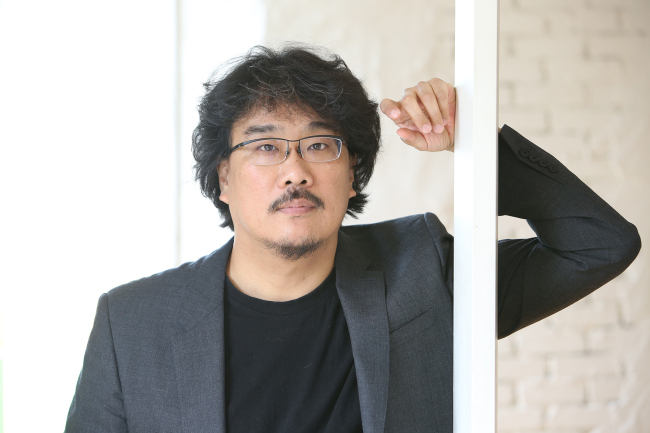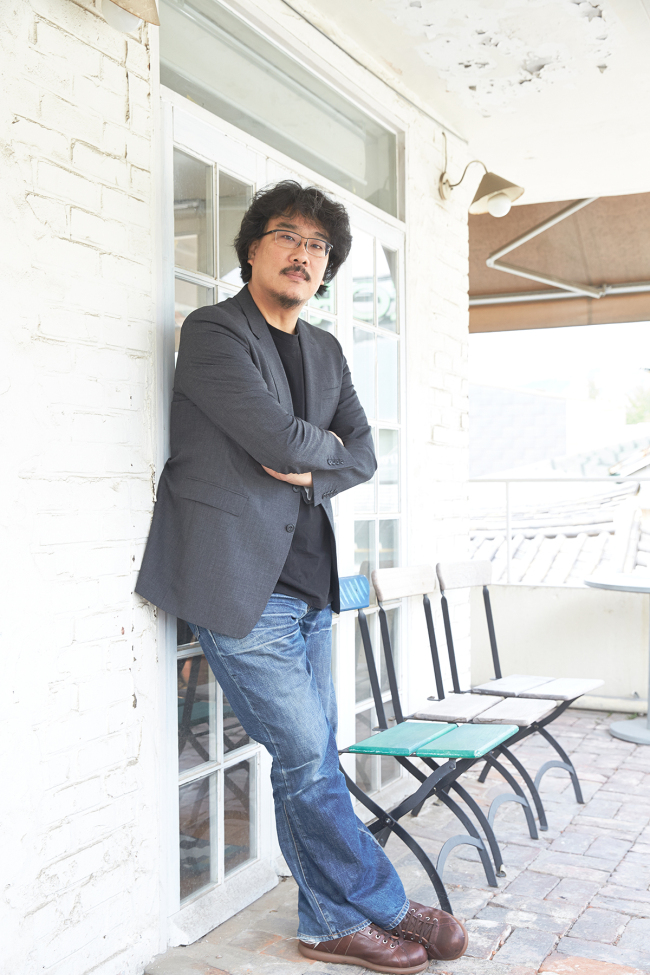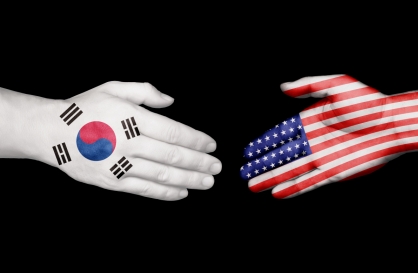[Herald Interview] Bong Joon-ho on ‘Okja’ and the omnivore’s dilemma
Director ponders duality of animals as food and pets, the instinctive cravings of humans
By Rumy DooPublished : June 28, 2017 - 15:05
Bong Joon-ho’s “Okja,” which centers on the struggles of a genetically modified super-pig, has been described as an environmentalist film and a proponent of veganism and animal rights, among other things.
But some have said that the well-being of animals can seem a distant issue when food is lacking and basic survival is still a battle in many countries.
“It’s true. The perspective can be very different in Third World countries, where it is difficult for people just to get by,” Bong told The Korea Herald in an interview at a cafe in Palpan-dong, Seoul, on Wednesday.
The director says he is a regular viewer of TV shows like “Animal Farm,” a long-running Korean program that spotlights people and their pets. “They all have their stories,” he said, launching into a description of the last show he watched featuring two dogs living with a family that faced financial struggles.
Bong believes that essentially, the connection between living beings can be relatable regardless of wealth, as exemplified by Mija, Okja’s caretaker and best friend in the film, who is neither a privileged nor well-educated girl.
“I do have a belief that (animal rights) can be a universal theme. When we’re pushed to extreme situations, on the contrary, that’s when human beings can become the most humane.
“That’s what makes Okja all the more precious.”
But some have said that the well-being of animals can seem a distant issue when food is lacking and basic survival is still a battle in many countries.
“It’s true. The perspective can be very different in Third World countries, where it is difficult for people just to get by,” Bong told The Korea Herald in an interview at a cafe in Palpan-dong, Seoul, on Wednesday.
The director says he is a regular viewer of TV shows like “Animal Farm,” a long-running Korean program that spotlights people and their pets. “They all have their stories,” he said, launching into a description of the last show he watched featuring two dogs living with a family that faced financial struggles.
Bong believes that essentially, the connection between living beings can be relatable regardless of wealth, as exemplified by Mija, Okja’s caretaker and best friend in the film, who is neither a privileged nor well-educated girl.
“I do have a belief that (animal rights) can be a universal theme. When we’re pushed to extreme situations, on the contrary, that’s when human beings can become the most humane.
“That’s what makes Okja all the more precious.”

Bong’s much talked-about sixth film is about the bond between a girl and a pig and their fight against a multinational food research company. It is the director’s latest work spotlighting ecological issues: “The Host” (2006) saw a monstrous creature born out of chemical waste dumped in the river, while the characters in “Snowpiercer” (2013) were confined to life inside a train after the earth froze over.
“Okja” shows a wide spectrum of attitudes toward meat-eating, from a gargantuan corporation that regards animals as a massive source of profit, to country folk for whom killing and eating animals is the most natural form of sustenance. It also features activists who protest any kind of processing when it comes to food.
“It’s the omnivore’s dilemma,” said Bong.
We conveniently separate our pets from the meat we consume, he added. “At grocery stores, we hold our dog in one hand and shop for beef or pork with the other hand. But they’re the same -- animals.”
At the same time, Bong believes that animals are “meant to be eaten.”
“Human beings are omnivores by instinct. There are people who opt for veganism, of course, but by choice.”
“Okja” is not advocating veganism so much as asking people to consider, even briefly, the conveyor-belt production system living creatures are subjected to today, Bong said.
“Scenes show Mija eating chicken soup, for example. It’s natural. But today we have the mass-production capitalist consumption of animals as food. That’s completely different from when people ate meat from individual cows on village farms.”
Having visited a beef plant -- “They object to the term ‘slaughterhouse,’” Bong said -- in the US Midwest as part of research for the film, Bong observed that there was a “clear boundary crossing over from life to death” for the cattle there.
“As the animal is stunned, there is a specific point when the living animal becomes a hunk of meat, a product.”

“Okja” is set to hit the Netflix streaming platform in some 190 countries and a select number of theaters in the US, UK and Korea on Thursday. It has been at the center of controversy in the international cinema scene due to conflict between theaters and its backer Netflix.
Bong laughed at the irony of being funded by a huge company when the chief villain of his film is another -- albeit fictional -- international conglomerate.
He referenced “Ed Wood,” Tim Burton’s 1994 comedy-drama in which the protagonist, an oddball film director, goes so far as to be baptized to receive funding from a Baptist church.
But Bong said he had simply chosen to partner with a studio that allowed him complete artistic freedom, even if it meant controversy in other areas.
Bong shies away from taking too firm a stance on the issue of theaters vs. online streaming. He is neither a cinema purist nor a crusader of the digital platform, but a filmmaker.
“Other studios would always require some kind of change to the script,” he said. “From a creator’s perspective, we’re just interested in making the movie we envision in our mind.”
Bong does believe, meanwhile, that filmmaking will become an increasingly international venture. “Okja’s” film crew consisted of graphic designers, costume designers, writers and musicians from both the US and Korea. “That kind of project is not going to be an unusual thing soon.”
His next film, however, will be a film made entirely in Korean and in Korea. Called “Parasite” (tentative title), it is set to star actor Song Kang-ho. “The scenario will be done later this year. I’m planning on filming early next year. ... I hope to shoot it quietly and release it quietly,” he said with a grin.
By Rumy Doo (doo@heraldcorp.com)


![[AtoZ into Korean mind] Humor in Korea: Navigating the line between what's funny and not](http://res.heraldm.com/phpwas/restmb_idxmake.php?idx=644&simg=/content/image/2024/04/22/20240422050642_0.jpg&u=)


![[Herald Interview] Why Toss invited hackers to penetrate its system](http://res.heraldm.com/phpwas/restmb_idxmake.php?idx=644&simg=/content/image/2024/04/22/20240422050569_0.jpg&u=20240422150649)

![[Graphic News] 77% of young Koreans still financially dependent](http://res.heraldm.com/phpwas/restmb_idxmake.php?idx=644&simg=/content/image/2024/04/22/20240422050762_0.gif&u=)






![[Exclusive] Korean military to ban iPhones over security issues](http://res.heraldm.com/phpwas/restmb_idxmake.php?idx=652&simg=/content/image/2024/04/23/20240423050599_0.jpg&u=20240423171347)



